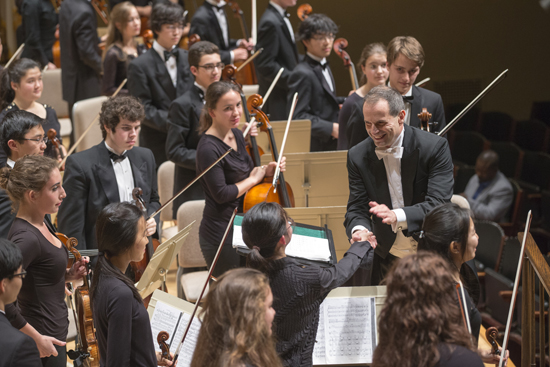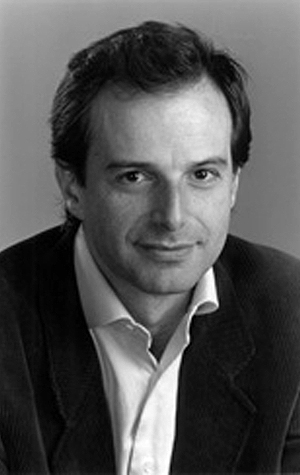Boston Youth Symphony to Perform Verdi’s Rigoletto
BU-based group kicks off composer’s bicentennial

Federico Cortese conducts the Boston Youth Symphony, BYSO’s most accomplished ensemble. The BYSO has been based at the College of Fine Arts for 55 years. Photos courtesy of Boston Youth Symphony Orchestras
The Boston Youth Symphony Orchestras is kicking off the bicentennial of the birth of composer Giuseppe Verdi with a semi-staged performance of his operatic masterpiece Rigoletto, a tale of seduction, betrayal, and revenge based on a play by Victor Hugo. The opera takes its name from the hunchbacked court jester at the center of the drama, one of classical opera’s most poignant roles. The BYSO has made its home at BU’s College of Fine Arts since it was founded 55 years ago.
The January 20 performance at Harvard University’s Sanders Theatre will feature gifted high school students from around New England under the musical direction of Federico Cortese, BYSO music director since 1999. The young musicians will be joined by the Handel and Haydn Society Chorus, and a group of professional soloists, among them soprano Meredeth Kelly (CFA’10,’12).
“The College of Fine Arts celebrates BU’s long-standing relationship with the Boston Youth Symphony Orchestras,” says Benjamin Juarez, dean of CFA. A youth orchestra was the inspiration of Robert Choate, former dean of CFA, in 1958. Today the BYSO is well known to musicians who venture into the CFA building on Sundays, when the halls and older practice rooms come alive with the melodic bustle of the ensembles and full orchestras that bring together nearly 500 students age 6 to 18. “It’s very nice that BU lets us do that,” says Cortese, who describes these Sundays as overflowing with children, mentors, and parent and student volunteers.
The students enrolled in the BYSO come from more than 120 communities throughout the region, says Cortese. He recalls one student who took a bus more than two hours each way from Bangor, Maine, to attend rehearsals. Once they join the BYSO, the young musicians tend to stay involved until they graduate high school. By the time they reach senior year, the dropout rate is less than 5 percent, he says. The BYSO comprises three full symphonic orchestras, two string training orchestras, a preparatory wind ensemble, and six chamber orchestras, as well as the Intensive Community Program, which offers string training for youth from inner-city communities in and around Boston. It also offers a two-week summer camp in Maine, recently expanded from a four-day retreat.

“It’s an extraordinary group of kids—enthusiastic and hardworking,” says Cortese, who is also music director of the New England String Ensemble and conductor of the Harvard-Radcliffe Orchestra and was assistant conductor of the Boston Symphony Orchestra from 1998 to 2002. CFA students are involved with BYSO in many ways, from mentoring to work-study jobs. And CFA often loans instruments to the young musicians. “The opportunity that BYSO offers these young people is nothing short of amazing,” says Juarez. “From performing at Symphony Hall to playing under the inspiring rigor of Maestro Cortese to receiving instruction from distinguished musicians to fostering underserved young musicians to raising the bar for music youth organizations on a national and international stage, BYSO’s leadership is unique and remarkable.”
The Boston Youth Symphony (BYS), BYSO’s most accomplished ensemble, remains the only youth orchestra in the nation that performs entire operas, notes Cortese, who has conducted BYS productions of Mozart’s Cosi fan tutte, Le nozze di Figaro, and Don Giovanni as well as Verdi’s Macbeth and Falstaff. He was asked to stage Rigoletto by the Consulate General of Italy in Boston as part of a yearlong city celebration titled America Discovers Italy. Rigoletto “is one of the operas Verdi was most proud of,” Cortese says, adding that the story, based on Hugo’s Le roi s’amuse, is a tragedy about someone who’s had a difficult life, with universal themes. The playful “La donna è mobile,” the opera’s famous tune familiar to nearly everyone, is sung in the background during a restaurant scene, but Rigoletto is one of Verdi’s darker operas, with characters who are tormented, cynical, and corrupt.
The performance “is a unique opportunity to experience the opera in this special collaboration between a professional cast of singers and the youth orchestra,” says composer Davide Ianni (CFA’11), a CFA lecturer on composition and theory. “Every time I experience an opera played by BYS musicians, I always discern a unique edge of excitement and anticipation in the performance of the music…Maybe it is the fresh outlook of the young soul that other professional orchestras lose in the process of becoming ‘professionals.’”
Designed and stage-directed by Doug Fitch, who has directed and designed productions for the Los Angeles and Santa Fe Operas, Rigoletto will feature “a hint of sets, a hint of costumes, and a little bit of props,” promises Cortese, who will conduct the orchestra on stage rather than in a pit. Singers will be “scattered around” the cavernous hall, he says. In addition to Kelly, in the roles of Giovanna and the Countess of Ceprano, the other professional singers include Weston Hurt as Rigoletto, Grigory Soloviov as Sparafucile, Nora Graham-Smith as Maddalena, David Kravitz as the Count of Monterone, Keith Harris as Marullo, Neal Ferreira as Matteo Borsa, Ian Bowling as the Count of Ceprano, and Liv Redpath as Page.
Rigoletto will be performed on Sunday, January 20, 2013, at 3 p.m. at Harvard University’s Sanders Theatre, 45 Quincy St., Cambridge. Tickets start at $30; discounted student and senior tickets are available. For tickets and information, call the Sanders Theatre box office at 617-496-2222. Free parking is available at the Broadway Garage, 7 Felton St.
Comments & Discussion
Boston University moderates comments to facilitate an informed, substantive, civil conversation. Abusive, profane, self-promotional, misleading, incoherent or off-topic comments will be rejected. Moderators are staffed during regular business hours (EST) and can only accept comments written in English. Statistics or facts must include a citation or a link to the citation.